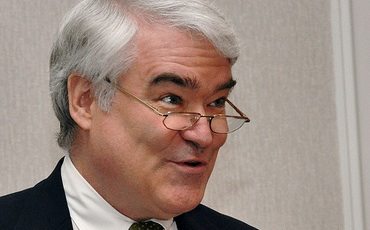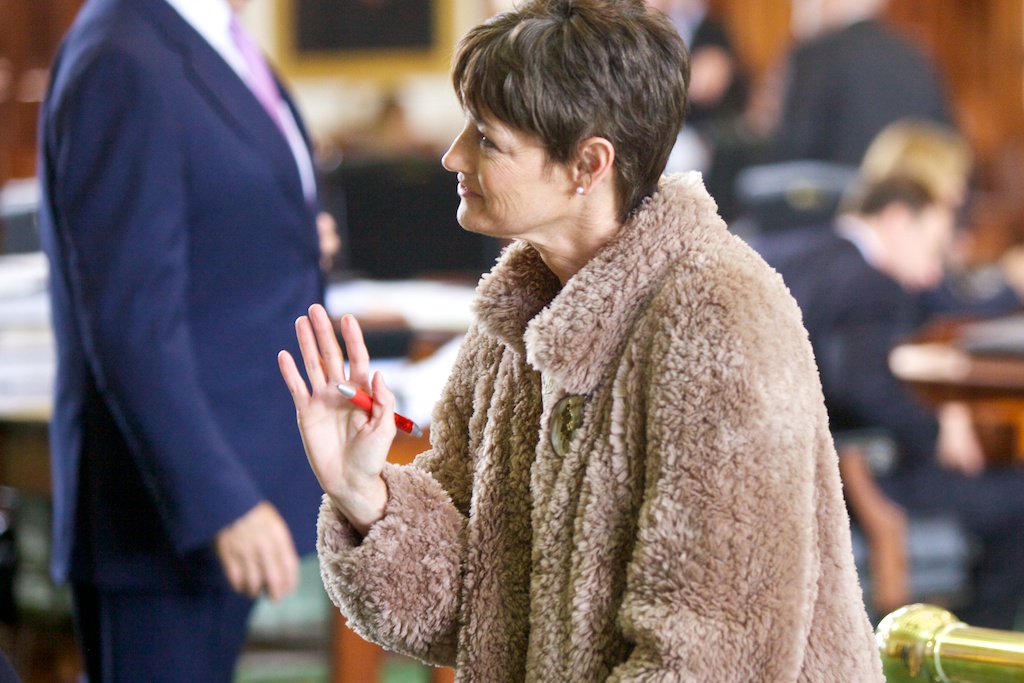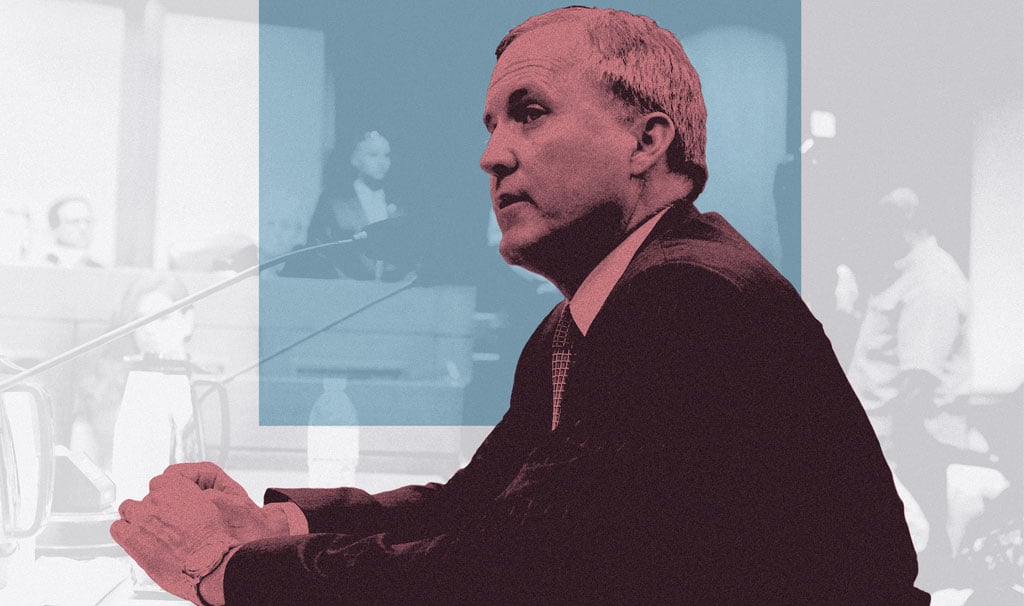
The Mystery of the Trial Lawyer-Funded Group Backing Tea Party Candidates
Balance PAC claims to have provided costly media services to candidates who've never heard of the group.

Above: Chief Justice Nathan Hecht
As political action committees go, Balance PAC is a strange animal. In 2012, the group, which is funded primarily by Democratic trial lawyers, supported minor Democratic judicial candidates and progressive groups.
But for this primary season, Balance PAC is pouring money into GOP primaries for Texas Supreme Court seats. The goal is to replace three incumbents—Chief Justice Nathan Hecht, Justice Jeff Brown and Justice Phil Johnson—with three other Republican challengers. Flush with trial lawyer cash, the PAC’s public face is “Texans 4 Justice,” which portrays itself as a conservative grassroots group. On its website Texans 4 Justice claims it works for people who stand for “common-sense conservatism” and “believe it’s time for true conservative change on the Texas Supreme Court.”
Balance PAC draws mostly from a base of traditional Democratic donors, including notable trial lawyers like John Eddie Williams and Lisa Blue Baron, who’ve each donated hundreds of thousands of dollars to Democratic causes over the years (full disclosure: Lisa Blue Baron was, until recently, an Observer board member). Houston personal injury law firm Arnold & Itkin LLP donated more than $100,000 this month.
The group’s social media accounts and website constitute a steady stream of appeals against the sitting Supreme Court justices: On Texans 4 Justice’s Facebook page, readers are urged to “elect 3 REAL conservative justices to the Texas Supreme Court: Robert Talton, Joe Pool Jr & Sharon McCally.” The group has set up attack sites and filmed surreal ads, particularly targeting Chief Justice Hecht.
So-called astroturf groups, which attempt to disguise their support and motivation, are commonplace in politics. Here’s the weird part: Balance PAC is reporting to the Texas Ethics Commission that the group donated some $64,000 of “in-kind” contributions to other, non-judicial Republican candidates—like hyper-conservative state Sen. Donna Campbell (R-New Braunfels). Seems strange for a Democratic-backed PAC that’s focused on judicial races to support a tea party state senator like Campbell.
But the story gets stranger: Campbell and other Republicans who supposedly received the “in-kind” contributions say they knew nothing about the donations and say Balance PAC has never contacted them to indicate they would be supporting their candidates, or listing them on their financial disclosures. The campaigns say they never received a dime’s worth of services and would’ve rejected the donation if it had been offered. None of the candidates claims a donation from Balance PAC on their own filings.
“The Campbell campaign would never accept a contribution of any kind from Balance PAC,” said Allan Blakemore, who manages Campbell’s campaign. “Sen. Campbell does not support the political goals of Balance PAC, nor the people behind the organization.”
Why would Balance PAC’s Democratic donors be directing resources to Campbell, one of the most conservative senators in the Legislature—and candidates who are unopposed in their primary election? And why wouldn’t Balance PAC let these candidates know that they intended to support them?
Balance PAC’s most recent campaign finance disclosure report, covering activity in February, shows that the PAC spent $150,000 on “media consulting” services for candidates as disparate as Campbell, state Rep. Sarah Davis (R-Houston), attorney general candidate Dan Branch—and even some candidates unopposed in their primary, like state Rep. Dwayne Bohac (R-Houston).
That’s surprising given that Balance PAC’s overwhelming focus has been the three contested Texas Supreme Court races. “This is a broad coalition of Texans who believe the court has been taken over by multinational corporations,” Balance PAC spokesman Eric Axel told the Houston Chronicle‘s Patricia Kilday Hart.
One example: Balance PAC reports that in February, it received both a $12,500 contribution of media consulting services from Campbell, and, in the same time period, a $12,500 donation of media consulting services to Campbell.
“To be honest with you, I have no idea what’s going on. It doesn’t make any sense,” Blakemore said. “We’ve never talked to these guys. We didn’t engage with them, talk to them, participate in anything with them in any way.” Blakemore called the idea that Campbell received or gave any contributions to Balance PAC “an outright lie” and “just outrageous,” indicating Campbell would be filing charges with the Ethics Commission if the political action committee doesn’t quickly amend its report and apologize.
On Wednesday, the group amended its form to indicate Campbell didn’t donate resources to Balance PAC—but continues to list Campbell as a recipient of Balance PAC’s largess. Blakemore told me Monday afternoon that Campbell still intends to file a complaint with the Ethics Commission.
What did Balance PAC do for these candidates? The PAC reports spending $150,000 for consulting services through the Tallahassee, Florida–based Sachs Media Group. The PAC’s disclosure report divides that $150,000 into donated consulting services, assigning a dollar figure for each recipient. Of the total figure, $83,500 is spread among an array of Texas Republicans running for the Legislature and statewide office, and one Supreme Court justice, Jeff Boyd, who’s unopposed in his primary.
It’s not illegal for state campaigns to coordinate with political action committees—to pool media consulting expenditures, for example, as the filing seems to imply. But if an outside group plans to claim an in-kind donation of services to a candidate, without coordinating with the campaign, the candidate is customarily notified so that the candidate can duplicate the donation on his or her own financial disclosure. Not only were the candidates not notified, they dispute the Balance PAC contributions.
“That’s the big problem here,” Blakemore said. “They put their filing and ours into conflict.”
None of the candidates who supposedly received the $83,500 in in-kind donations reported one from Balance PAC—nor, for that matter, do any of the three judicial candidates who are the major focus of Balance PAC’s activities.
Annette Ratliff, who manages state Sen. John Carona’s campaign—which supposedly received $5,500 in in-kind donations from Balance PAC—said she wasn’t aware of the group either. “We have no knowledge of what they’re doing. If they’re doing something on behalf of us, they’re doing it without contacting us, without our knowledge and without our consent,” she said, adding that she had never seen a PAC do something quite like this.
Enrique Marquez, Dan Branch’s campaign manager, denied Branch’s campaign had ever worked with Balance PAC, and said they had received no notice Balance PAC would claim a donation. “We did not coordinate with Balance PAC. They didn’t alert the campaign, and we have no idea what that figure represents,” Marquez said, calling the filing “pretty wild.”
“I don’t know the motivation, and I wouldn’t venture a guess,” she said. “But you’re going to have a lot of campaigns asking for corrections.”
Texas’ election law places certain requirements on third-party donations to judicial candidates. Outside groups like Balance PAC are limited to spending $25,000 on statewide candidates in judicial elections. They can exceed that limit, but if they plan to do so, they have to notify the Texas Ethics Commission of that intent no less than 60 days before an election. Virtually all of Balance PAC’s activity has taken place past that point, in the last month of the election cycle.
Balance PAC spent $150,000 on last–minute media consulting, reporting that the $150,000 was intended for the benefit of 12 candidates. Balance PAC reported donating a little under $25,000 to four Supreme Court candidates—three contested elections, plus the unopposed Boyd. Then, the PAC reported that the remaining portion of the services was donated to other candidates, though it’s not clear what Balance PAC did on their behalf apart from naming them in an endorsement list and embedding their campaign ads on the PAC’s website.
Ben Sachs, the head of Sachs Media Group, said he couldn’t answer questions related to the financial filing—but did say that his consulting group had helped Balance PAC diversify its campaign spending to a “wider and more diverse slate” of GOP candidates around the state.
Balance PAC’s treasurer didn’t return a request for comment. The PAC’s spokesman, Eric Axel, told me that the group had diversified its donations out of a genuine desire to help “people who vote in the Republican Primary,” adding that the group would not be “defined by the traditional left/right boundaries,” and that “when we see candidates we like, we will provide them with support based on them as candidates and their records [as] public servants.”


